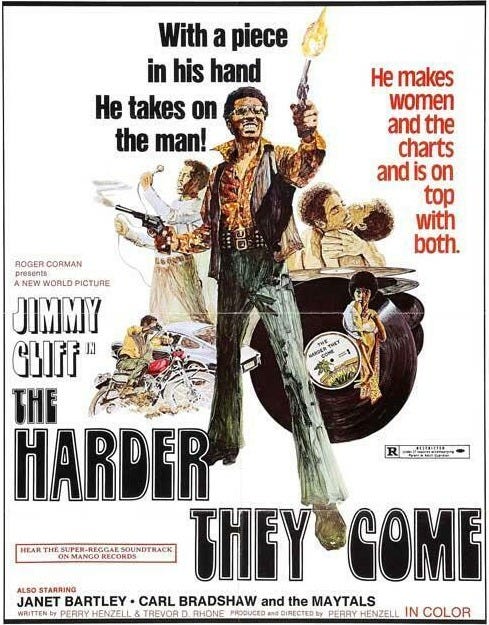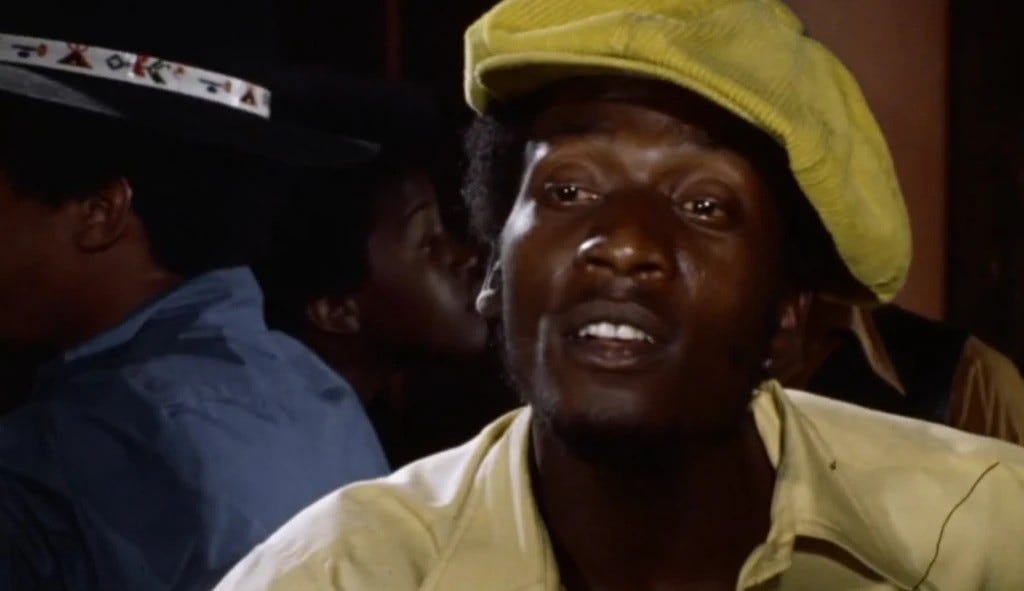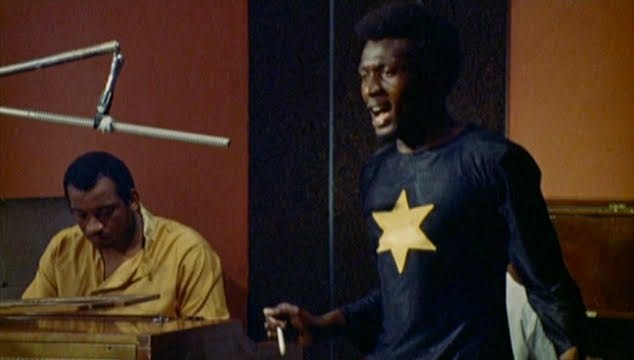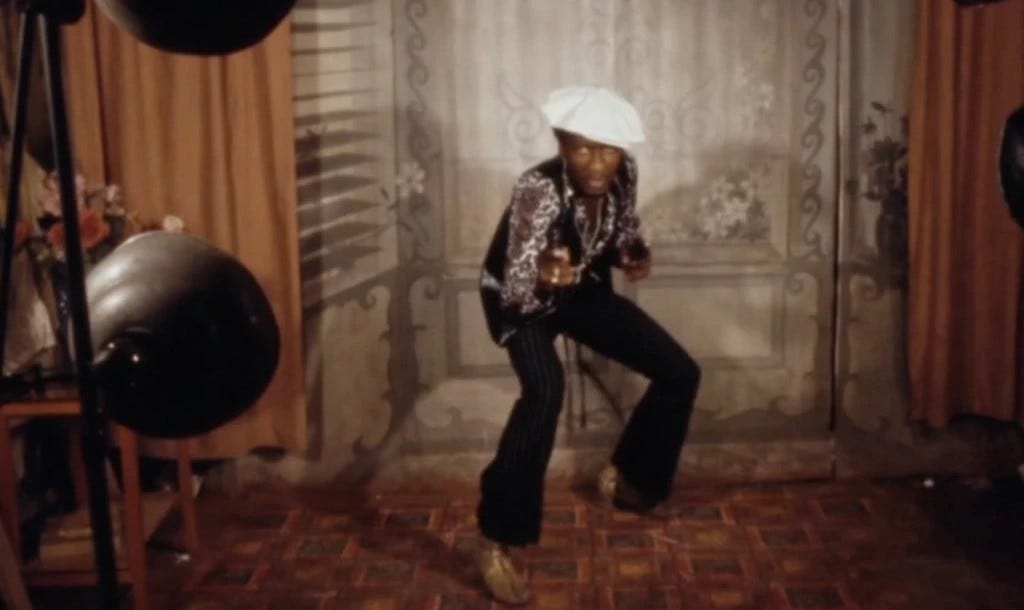The Harder They Come
Written by Perry Henzell and Trevor D. Rhone
Directed by Perry Henzell
1973
The Blaxploitation genre, by its nature, was focused on the United States. It dealt with the concerns of Black people living in American cities, an audience that had been long-neglected by Hollywood but was finally being targeted with films that addressed their specific concerns. But that doesn’t mean the genre only included American films. The Harder They Come, a Jamaican film, fits the bill for a number of reasons, including a plot that involves a man in hard circumstances taking the law into his own hands and rising up against corrupt and oppressive authority figures. Plus, it has a banging soundtrack that helped popularize reggae music, making for a nice companion piece to the many funky and soulful albums that accompanied American Blaxploitation films.
The movie stars reggae singer Jimmy Cliff as Ivanhoe “Ivan” Martin, a guy who moves to the big city (or what passes as one in Jamaica) after spending his life in the country. He’s ostensibly there to inform his mother about his grandmother’s death, but she doesn’t seem too happy to see him, and she makes it clear that she’s not at all interested in supporting him. He’s on his own, and while he struggles at first (even before he locates his mom, a pushcart driver steals almost all of his possessions), he ends up scrounging together a semblance of an existence by working for a local preacher. But his real hope is to audition for a local music producer, record a song, and make it big as a popular musician.
It takes a while before he gets the chance, with many of the early scenes establishing what life on the streets is like. Ivan spends some time fixing up a bicycle and wooing a girl who is living with the preacher as her guardian. When he convinces her to leave the preacher, he gets fired and his bike gets given away to someone else, prompting violence when he tries to get it back. After he wins a surprisingly bloody knife fight (featuring that extra-red fake blood that showed up in low-budget movies of the period), he gets arrested and sentenced to a humiliating whipping. It’s pretty striking, with the level of violence he uses seeming pretty extreme and letting us know that while we may be rooting for him as the main character of the movie, he’s not a very good guy.
Ivan finally gets his break when he runs an errand that takes him to the music producer’s studio, allowing him to arrange an audition. He sings the track that gives the movie its title, “The Harder They Fall,” but the producer only offers him a one-time fee of $20. He refuses, believing that it’s a hit, but when he takes the record around town, nobody will play it because they don’t want to ruin their relationship with the producer. So he’s eventually forced to accept the $20, and while he does hear the song played at a local dance hall, it’s quickly buried and forgotten.
This prompts him to seek out other methods of making money, and it turns out the best option is the ganja trade. But while that seems to work for a while, he quickly becomes disillusioned by how much money goes to the people higher up the distribution chain when it seems like he’s doing all the work. When the military burns down some marijuana fields as part of their ongoing fight against the drug trade, but Ivan is still expected to make his regular payment to his boss, he refuses, making him persona non grata with the higher-ups.
Once Ivan loses the protection he once had against law enforcement, a police officer tries to arrest him, but memories of his whipping keep him from going peacefully. Instead, he shoots the officer who was chasing him on a motorcycle, which gives us an especially dynamic shot from the officer’s point of view as he crashes. Now, Ivan is on the run from both the police, but while he may be public enemy number one, he’s become something of a folk hero, with people cheering him on, giving him protection, and leaving graffiti all over the place about how he’s hiding under the noses of the authorities and they’ll never find him.
Since Ivan is suddenly the most famous person in Jamaica, his record gets dusted off, and it becomes the hit that everyone wants to hear. He seems to have gotten everything he always wanted, and he cuts a dynamic figure, always managing to stay one step ahead of the people who want to hunt him down. At one point, he even forces a photographer to take some glamor shots of him posing with guns, and he sends a copy to the local newspaper hoping they’ll print it. He’s one of those figures who gain fame and notoriety for defiance of the law, and even though his methods are brutal, gunning down numerous cops who try to catch him and terrorizing others who get in his way, he’s popular as an example of someone who is refusing to succumb to the difficult circumstances so many other people find themselves in. Of course, like so many other of these figures, his days are numbered, and it’s evident that his actions are going to catch up with him at some point.
This is a pretty classic story of the type that has featured in many movies and real-life stories with these types of outlaws. While it could have been inspired by Bonnie and Clyde, John Dillinger, or classic gangster movies starring James Cagney or Edward G. Robinson, it seems that the filmmakers based the character on a Jamaican criminal from the 1940s. However, they added the details about drugs and music, which is the element that really allowed Jimmy Cliff to bring the character to life. He’s charismatic and exciting to watch, somebody who can believably get the public on his side but who also can only survive for so long before he’s taken down.
The setting of the movie also makes it unique, and it has an authentic, street-level feel as the characters move through shantytowns, junkyards, and garbage dumps as they try to eke out a living. Everybody speaks English, but their accents are so thick that the movie has to be subtitled to really understand what anyone is saying (hilariously, there’s one scene where a radio DJ imitates the standard American style of speaking, and it’s ridiculously over the top and full of nonsensical slang that I’m sure nobody ever used). It’s a familiar story in a community that’s just outside the area of experience that most Americans understand, which makes it feel fresh and interesting.
That’s not to say that the movie is without its faults. The first half kind of drags, and while Cliff is a compelling performer, most of the actors around him range from fairly amateurish to pretty atrocious (the music producer is especially bad, barely even able to get a comprehensible line out). But when the music starts playing, any faults are forgotten. In addition to the aforementioned song that provides the title, the soundtrack includes Cliff’s “You Can Get It If You Really Want,” as well as “Pressure Drop” by The Maytals and a number of other good tracks. If getting more people to listen to reggae was the movie’s only legacy, it would be worthwhile, but it’s also an enjoyable story that occasionally features stylish camerawork and editing. It’s definitely worth checking out, and I’m sure it’s going to have me humming this music for the next few weeks.
Blaxploitation Education index:
UpTight
Cotton Comes to Harlem
Watermelon Man
The Big Doll House
Shaft
Sweet Sweetback’s Baadasssss Song
Super Fly
Buck and the Preacher
Blacula
Cool Breeze
Melinda
Slaughter
Hammer
Trouble Man
Hit Man
Black Gunn
Bone
Top of the Heap
Across 110th Street
The Legend of N***** Charley
Don’t Play Us Cheap
Shaft’s Big Score!
Non-Blaxploitation: Sounder and Lady Sings the Blues
Trick Baby









HAS to be a Top Ten Desert Island movie soundtrack for ANYONE who deigns to compose such a thing. GREAT movie.
Fromtheyardtothearthouse.substack.com
"What passes for the big city" is Kingston, Jamaica's capital.
Like other films of this period, it doesn't shy away from urban violence; only the setting separates it from many American films of the time in that regard. The uniqueness comes from the reggae music, as the genre was just beginning to become popular outside of Jamaica at this time.
Ivan's treatment at the hands of the record producer recalls how real-life producers Leslie Kong and Coxsone Dodd treated the likes of Bob Marley and Lee "Scratch" Perry in the previous decade. Little did they know that these artists (including Cliff himself) would become known far and wide, while they themselves would only figure as footnotes in popular culture history.